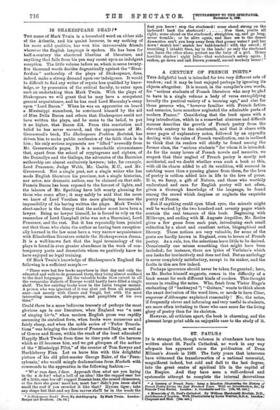IS SHAKESPEARE DEAD ?* Tan name of Mark Twain is
a household word on either side of the Atlantic, and his quaint humour, to say nothing of his more solid qualities, has won him innumerable friends wherever the English language is spoken. He has been for half-a-century the chartered libertine of literature, and anything that falls from his pen may count upon an indulgent reception. The little volume before us, which in some twenty- five thousand words decides dogmatically against the " Strat- fcrdian " authorship of the plays of Shakespeare, does, indeed, make a strong demand upon our indulgence. It would be difficult to find any writer of repute less qualified by know- ledge, or by possession of the critical faculty, to enter upon such an undertaking than Mark Twain. With the plays of Shakespeare we will grant that he may have a competent general acquaintance, and he has read Lord Macaulay's essay upon "Lord Bacon." When he was an apprentice on board a Mississippi steamboat, he convinced himself by the aid of Miss Delia Bacon and others that Shakespeare could not have written the plays, and he came to the belief, to put it no higher, that Bacon did. From this conviction and belief he has never wavered, and the appearance of Mr. Greenwood's book, The Shakespeare Problem. Restated, has
driven him to make public confession of the faith that is in him; his only serious arguments are "lifted" avowedly from Mr. Greenwood's pages. It is a remarkable circumstance
that, apart from the school of cryptograms and ciphers, of the Donnellys and the Gallups, the advocates of the Baconian authorship are almost exclusively lawyers; take, for example, Lord Penzance, Judge Webb, Mr. Castle, K.C., and Mr.
Greenwood. Not a single poet, not a single writer who has made English literature his province, not a single historian, nor actor, nor dramatic author, can be claimed on that side.
Francis Bacon has been exposed to the fiercest of lights, and the labours of Mr. Spedding have left scanty gleaning for those who come after ; it may safely be said that the more we know of Lord Verulana the more glaring becomes the impossibility of his having written the plays. Mark Twain's sheet-anchor is the theory that the author must have been a lawyer. Being no lawyer himself, he is forced to rely on the researches of Lord Campbell (who was not a Baconian), Lord Penzance, and the rest. But it has repeatedly been pointed out that those who claim the author as having been exception- ally learned in the law must have a very narrow acquaintance with Elizabethan literature outside the Shakespearean drama.
It is a well-known fact that the legal terminology of the plays is found in even greater abundance in the work of con- temporary poets and dramatists whom we positively know to have enjoyed no legal training.
Of Mark Twain's knowledge of Shakespeare's England the following is a sufficient sample:—
"There were but few books anywhere in that day and only the educated and well-to-do possessed them, they being almost confined to the dead languages. All the valuable books then extant in all the vernacular dialects of Europe would hardly have filled a single shelf. The few existing books were in the Latin tongue mainly. A person who was ignorant of it was shut out from all acquaint- ance—not merely with Cicero and Vergil, but with the most interesting memoirs, state-papers, and pamphlets of his own time."
Could there be a more ludicrous travesty of perhaps the most glorious age in our literature, when England was "a nest of singing birsls," when modern English prose was rapidly assuming its stateliest form, when books were numerous and fairly cheap, and when the noble series of "Tudor Transla- tions "was bringing the classics of France and Italy, as well as of Greece and Rome, within the reach of the least educated? Happily Mark Twain from time to time puts off the harness which so ill becomes him, and we get glimpses of the author of the "Mississippi Pilot," of the creator of Tom Sawyer and Huckleberry Finn. Let us leave him with this delightful picture of his old pilot-master George Baler, of the 'Penn- sylvania,' who would mingle declamations from Macbeth with commands to the apprentice in the following fashion :—
" W1 aS man dare, flare. Approach thou what are you laying in the e As for? what a hell of an idea! like the rugged ease her off a little, ease her off ! rugged Russian bear, the armed rhinoceros, or the there she goes! meet her, meet her ! didn't you know she'd smell the reef if you crowded it like that ? Hyrcan tiger ; take any shape but that and my firm nerves she'll be in the weeds the Is Shakespeare Dead? From Hp Autobiography. By Mark Wahl. London:
Harper and Brothers. [Si. tt4.1 '
first you know ! stop the starboard! come ahead strong on the larboard! back the starboard Now then, you're all right ; come ahead on the starboard; straighten. up, and go long, never tremble ; or be alive again, and dare me to the desert damnation can't you keep away from that greasy water ? pull her down ! snatch her ! snatch her bald-headed! with thy sword ; if trembling I inhabit then, lay in the leads! no only the starboard one, leave the other alone, protest me the baby of a girL Hence horrible shadow ! eight bells—that watchman's asleep again, I reckon, go down and c1:11 Brown yourself, unreal mockery hence !"






























































 Previous page
Previous page